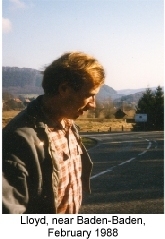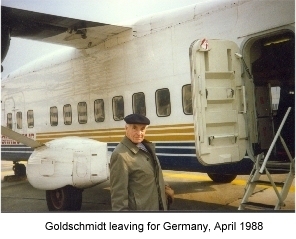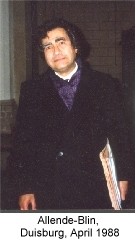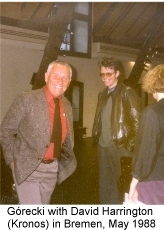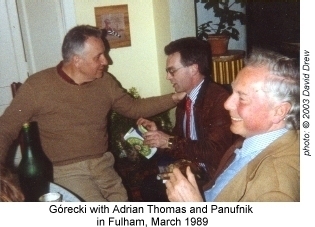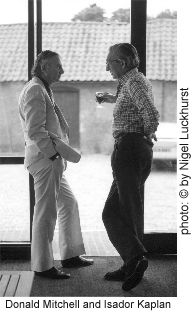|
February: to
Baden-Baden (Germany) with Jonathan Lloyd for the rehearsals and
recording of his Second Symphony (by the Südwestfunk Orchestra under
Lothar Zagrosek) followed by its public premiere on the 27th. In Heidelberg,
Lloyd and D attend a performance of Kresnik's dance-play Macbeth, with
music by Schwertsik. The production is successfully recommended to
John Drummond, then Director of the Edinburgh International Festival.
9 March: First meeting
of Les Amis du Compositeur Igor Markevitch in Lausanne. The work of the
committee will be continued for five years. Some of its aims are subsequently
reflected in the extended series of recordings of Markevitch's orchestral and
choral works conducted by Christopher Lyndon-Gee and released on the Marco Polo
label.
March:
Postscript 1988 [to Tadeusz Marek's "Górecki in
Interview,1968] is published in Tempo No.168.
Wolfgang von
Schweinitz has been commissioned by the city of Munich to write an opera
for Hans Werner Henze's Biennnale. He intends to use the entire text of the
Book of Revelations as his text. Henze asks D to help persuade
Schweinitz to consider some other and more 'dramatic' subject. After a long
discussion in Hamburg, D reports that Schweinitz is adamant. Henze accepts with
good grace, and resolves to engage Ruth Berghaus as director. Schweinitz
collaborates with D.E. Sattler on a libretto using the entire biblical
text. Sattler is an internationally respected Hölderlin expert who has his
own publishing house in Bremen - the Bremer Bibel is one of his many
idealistic projects. The libretto, like the opera based upon it, has the
post-Hölderlin title Patmos.
24-26 April: D with
Goldschmidt in Duisburg for the German premiere of Letzter
Kapitel, given in one of the concerts of 'suppressed music' organised for
the Duisburger Akzente series by the composer Juan Allende-Blin. Visit
to Wilhelm-Lehmbruck-Museum; Felix Nussbaum exhibition.
May: Górecki
- in Frankfurt with Fell and Drew - signs a publishing agreement with
Boosey & Hawkes Music Publishers. David Huntley, a key figure in
B&H's New York office, successfully promotes Górecki to
Robert Hurwitz of Nonesuch Records, and to Kronos (the internationally
renowned string quartet, led by David Harrington, and recorded by Nonesuch).
Drew suggests that a fragment for string quartet which Górecki had shown
him in Katowice the previous year might be a suitable starting point for a
piece for Kronos. David Harrington and his Kronos colleagues welcome the idea.
Górecki re-works the fragment as a 16-minute quartet, Already it is
Dusk. Four months later, Górecki brings the manuscript of
Already it is Dusk to Bremen, where D introduces him to Kronos and acts
as intermediary at a rehearsal.
Michael Vyner,
Artistic Director of the London Sinfonietta, receives a package of scores and
recordings of Górecki's music. Together with David Atherton - co-founder
and first conductor of the London Sinfonietta - he decides to devote an entire
weekend in the spring of 1989, Friday-Sunday, to the music of Górecki
and Alfred Schnittke. D's correspondence with Schnittke has continued
since 1971 (and the inception of the Stravinsky project for Tempo) and
has led to several meetings and discussions in Germany and Switzerland.
Despite the difficulty of
reaching Górecki by telephone and the near-certainty that no call will
be uninterrupted, Drew has been able during the past fifteen months to maintain
contact week-by-week. During the winter of 1988-89 the frequency has had to be
increased, since the permits and visas required for a visit to England for the
Sinfonietta weekend seem to constitute an almost insurmountable obstacle.
Eventually, after countless phone-calls, the problem is solved on the Polish
side, only to recur, no less intractably, at the British Foreign Office.
Representations are made, MPs are lobbied, and a British visa for
Górecki is finally issued.
1-3 September: With
John Adams in Edinburgh for UK premiere of Nixon in
China.
First discussions with the
Scottish composer James MacMillan; after an interlude with Universal
Edition, he will join Boosey & Hawkes in 1991. During the winter of
1988-89, Andrew Toovey and David Horne sign publishing agreements
with B&H.
1-10 October: In New
York as guest of the American Symphony Orchestra and Jesse Rosen, preparing for
the premiere at Carnegie Hall on the 9th of Cry, the Beloved Country
(Weill/Anderson/Paton), a concert sequence by DD commissioned by the ASO. The
conductor is Dennis Russell Davies.
|

